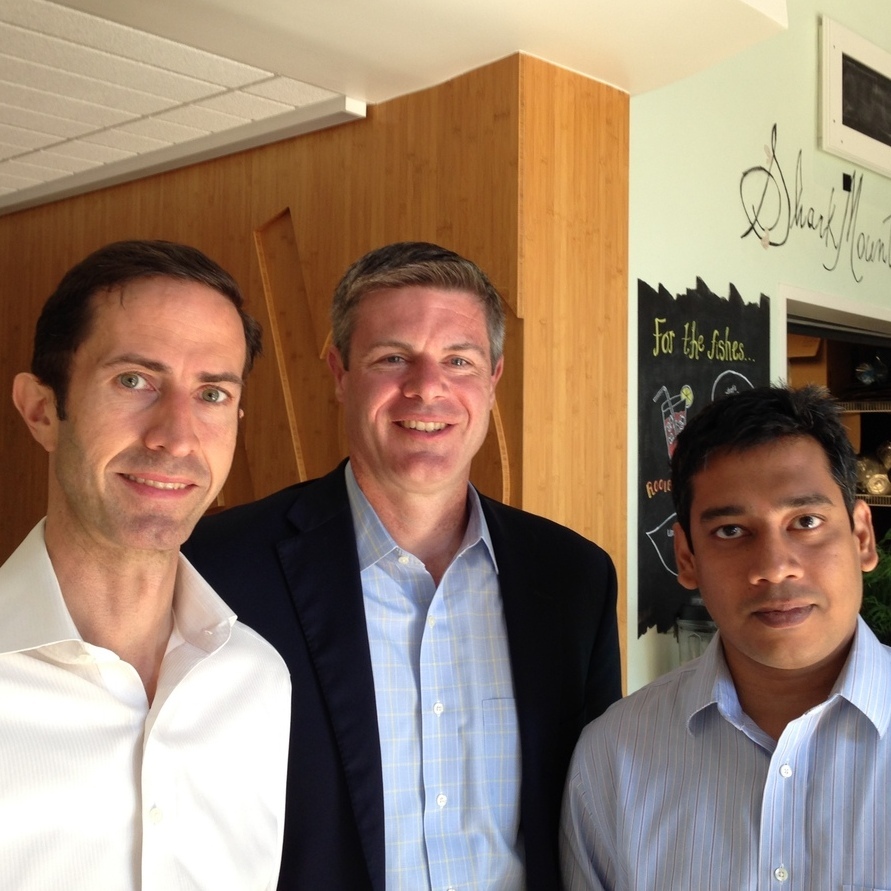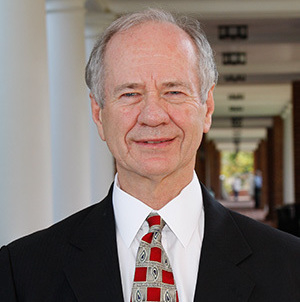UVA Darden Podcasts
Research & Relevance
Episodes

Wednesday Feb 19, 2020
Wednesday Feb 19, 2020
In advance of Darden hosting ClimateCAP: The Global MBA Summit on Climate, Capital and Business, keynote speaker Scott Price discusses the challenges and opportunities for a global logistics company to reduce its greenhouse gas emissions while cutting costs and improving its competitive position. He discusses commercialization of new technologies, including robotics, autonomous vehicles and drones, changing the way UPS conducts business in an increasingly urbanized and resource-constrained world. He shares the importance of pursuing mission alignment across the organization, and the necessary partnerships for progress. Hosted by Erika Herz from Darden’s Batten Institute for Entrepreneurship and Innovation.

Friday Aug 30, 2019
Friday Aug 30, 2019
As accelerator programs proliferate, entrepreneurship scholars like Batten Research Fellow Siobhan O’Mahony are attempting to understand the role they play in new ventures’ success. Dr. O’Mahony and her colleagues found great differences in the degree to which entrepreneurs take advantage of an accelerator’s resources and connections. Entrepreneurs also varied in their openness to integrating critical market feedback, which offers important lessons for directors of accelerators seeking the best model for supporting a cohort of founders. Dr. O’Mahony is the Feld Family Professor of Innovation and Entrepreneurship in the Department of Strategy and Innovation at Boston University’s Questrom School of Business.
Hosted by Erika Herz, Director of Research and Intellectual Capital at Darden’s Batten Institute for Entrepreneurship and Innovation.

Monday Jun 17, 2019
Monday Jun 17, 2019
The entrepreneurial pivot is a term popularized by entrepreneurs Steve Blank and Eric Ries, particularly through Ries’ well-known book The Lean Startup, and represents a company’s re-orientation of strategic direction. Batten Research Fellow Siobhan O’Mahony discusses her study of early-stage energy and cleantech hardware firms in the Boston area to better understand their pivots. Dr. O’Mahony unexpectedly found that a pivot is not just a one-time occurrence but a cumulative set of decisions made over time, based on critical information drawn from customers and other stakeholders. The research has important lessons for aspiring entrepreneurs who need to engage with their potential markets early, adapt to new information, or even exit. Dr. O’Mahony is the Feld Family Professor of Innovation and Entrepreneurship in the Department of Strategy and Innovation at Boston University’s Questrom School of Business.
Hosted by Erika Herz, Director of Research and Intellectual Capital at Darden’s Batten Institute for Entrepreneurship and Innovation. Read more about the entrepreneurial pivot here.

Wednesday Jun 05, 2019
Wednesday Jun 05, 2019
Scientists assert that global warming must be kept below two degrees Celsius to avoid insurmountable global disruption. Getting there will require near total decarbonization of economic activity by 2060. Agriculture accounts for a significant amount of GHG emissions worldwide but is also the one sector being hit the hardest by a changing climate. As the global population continues to grow – an additional 2 billion people predicted by 2050 – industry stakeholders are working diligently on technology solutions that will increase productivity while reducing carbon footprint.
We take a closer look at the two largest sources of GHG emissions – livestock farming and soil management – and explore the best practices and technologies that support carbon-smart farming. We'll then discuss the levers and opportunities in more detail with Darden Professor Mike Lenox, who is a co-author on the forthcoming report titled Path to 2060: Decarbonizing the Agriculture Industry.
We would like to thank Dominion Energy’s Ryan Childress, Beanstalk Farm’s Jack and Michael Ross, and UVA Professor James Galloway for their contributions to this podcast, which also includes insights from the March 2019 World Agri-tech Innovation Summit.
This is the fourth in a series of podcasts from the Business Innovation and Climate Change Initiative at Darden’s Batten Institute for Entrepreneurship and Innovation http://www.darden.virginia.edu/innovation-climate/. Episodes 5, 7, and 10 of Research and Relevance discussed automobiles, electric utilities, and industrials.
Podcast hosted by Becky Duff, Senior Research Associate for the Business Innovation and Climate Change Initiative, Batten Institute for Entrepreneurship and Innovation.

Friday Nov 30, 2018
Friday Nov 30, 2018
Scientists assert that global warming must be kept below two degrees Celsius to avoid insurmountable global disruption. Getting there will require near total decarbonization of economic activity by 2060. Industrial manufacturing accounts for a significant amount of greenhouse gas emissions in the U.S. and worldwide. Efforts to reduce energy consumption through more efficient operations have greatly reduced emissions but more innovation and investment is needed to decarbonize this critical sector. What levers could be pulled to facilitate a more rapid transition to low-carbon manufacturing?
We focus on the three largest emitters of CO2 – steel, cement, and petrochemicals – and explore some of the ideas and technologies best positioned to decarbonize these industries, and the challenges faced for broader adoption. We then discuss the levers and opportunities in the industrial sector with Darden Professor Mike Lenox, who is a co-author on the report titled Path to 2060: Decarbonizing the Industrial Sector.
This is the third in a series of podcasts from the Business Innovation and Climate Change Initiative at Darden’s Batten Institute for Entrepreneurship and Innovation http://www.darden.virginia.edu/innovation-climate/. Episodes 5 and 7 of Research and Relevance discusses the automobile and electric utility industries.
Podcast hosted by Becky Duff, Senior Research Associate for the Business Innovation and Climate Change Initiative, Batten Institute for Entrepreneurship and Innovation.

Wednesday Nov 28, 2018
Wednesday Nov 28, 2018
In our discussion with economists Pedro Matos and Jan Bena we explore their research on the impact of foreign investment on corporate innovation, as measured by number of patents. They describe the global corporate patent dataset they created, which is hosted by the Batten Institute for Entrepreneurship and Innovation and available for use by any scholars around the world who seek to better understand innovation outcomes. Matos and Bena share why this resource is novel and useful for researchers who have experienced limitations with earlier patent datasets. Hosted by Erika Herz from the Batten Institute.

Wednesday Nov 28, 2018
Wednesday Nov 28, 2018
As the world economy has become increasingly globalized and complex, it's not obvious what effects foreign investors have on the companies whose stock they hold. Is it possible that these foreign investors provide pools of capital that firms can access in order to produce stronger companies, or do global institutional investors behave more like a swarm of locusts, resulting in short-term corporate policy making such as reduction in capital expenditures? We discuss these questions and implications for corporate leaders with Pedro Matos, Darden finance professor and faculty director of the Mayo Center for Asset Management, and Jan Bena, professor at the University of British Colombia Sauder School of Business and a Batten Research Fellow. Matos and Bena are co-authors of the briefing,Testing "The Locust Hypothesis": The Impact of Global Investors on Long-Term Investment & Innovation. Hosted by Erika Herz from Darden’s Batten Institute for Entrepreneurship and Innovation.

Wednesday Apr 18, 2018
Wednesday Apr 18, 2018
Scientists assert that global warming must be kept below two degrees Celsius to avoid insurmountable global disruption. Getting there will require near total decarbonization of economic activity by 2060. Electricity generation accounts for a significant amount of greenhouse gas emissions in the U.S. and worldwide. Electric grids around the world are being decarbonized but a complete shift to 100% clean energy will likely take longer than 40 years. What will facilitate the transition and what threatens progress?
Let's begin by reviewing four zero-carbon emission generation sources and technologies that could lead us into the clean energy future – hydropower, nuclear energy, wind, and solar. We'll then discuss the levers and opportunities for solar and wind adoption with Devin Welch, Sun Tribe Solar, Erik Haug, Apex Clean Energy and Darden Professor Mike Lenox, who is a co-author on the forthcoming report titled Path to 2060: Decarbonizing the Electric Utility Industry.
This is the second in a series of podcasts from the Business Innovation and Climate Change Initiative at Darden’s Batten Institute for Entrepreneurship and Innovation http://www.darden.virginia.edu/innovation-climate/. Episode 5 of Research and Relevance discussed the automobile industry.
Sun Tribe Solar: www.suntribesolar.com
Apex Clean Energy: www.apexcleanenergy.com
Podcast hosted by Becky Duff, Lead Researcher for the Business Innovation and Climate Change Initiative, Batten Institute for Entrepreneurship and Innovation.

Wednesday Mar 07, 2018
Wednesday Mar 07, 2018
Why has the rate of U.S. entrepreneurship been on a steady decline for the past decade and what does it mean for the U.S. economy? Sean Carr, Ph.D., Executive Director of Darden’s Batten Institute for Entrepreneurship and Innovation speaks with Prof. John Haltiwanger from the University of Maryland and the National Bureau of Economic Research (NBER), whose research has played a major role in our understanding the determinants of firm-level job creation, job destruction, firm dynamics and economic performance. He has published more than 100 academic articles and numerous books including Job Creation and Destruction (with Steven Davis and Scott Schuh, MIT Press).

Tuesday Nov 28, 2017
Tuesday Nov 28, 2017
Scientists assert that global warming must be kept below two degrees Celsius to avoid insurmountable global disruption. Getting there will require near total decarbonization of economic activity by 2060. Transportation accounts for a quarter of GHG emissions in the U.S. but with the help of electric technologies we believe that we can decarbonize the passenger car sector by this deadline. The first part of the podcast tells the story of the electric car and the market conditions and innovations that have paved the way for electric cars today. We then follow the story with an interview with Darden Professor Mike Lenox (https://ideas.darden.virginia.edu/authors/michael-lenox/), an expert in business innovation and strategy and co-author on the report titled Path to 2060: Decarbonization of the Automobile Industry.
Topics we cover include (1) the era of ferment occurring as incumbents and entrepreneurial ventures battle to become the dominant electric vehicle platform. (2) how global demand, e.g. from the Chinese market, makes this era of electric vehicle production different from past efforts, (3) the role of regulation and consumer-oriented incentives in driving innovation and (4) the impact of U.S. technology policy (or lack thereof) on the U.S. electric vehicles market.
From the Business Innovation and Climate Change Initiative at Darden’s Batten Institute for Entrepreneurship and Innovation.
http://www.darden.virginia.edu/innovation-climate/
Soundbites used by permission of Peppercut Films http://www.whokilledtheelectriccar.com/ and Tesla https://www.tesla.com/. This podcast is Copright 2017, Rector and Visitors of the University of Virginia. All rights reserved.

Tuesday Jan 24, 2017
Tuesday Jan 24, 2017
What makes startups successful? Professors Raul Chao from Darden and Batten Fellow Rahul Basole from Georgia Tech discuss their research project, Visualizing the Startup Genome. This study brings together innovation science and computational toolkits to understand how the core elements of startup activities such as recruitment and financing, as well as the sequence of these events, relate to performance. Their project analyzes structured and unstructured data, as well as other forms of data such as images and video, to gain insights useful for innovation leaders. They also discuss the importance of data visualization for effective communication with a variety of stakeholders. Hosted by Erika Herz from Darden’s Batten Institute for Entrepreneurship and Innovation.

Thursday Oct 13, 2016
Thursday Oct 13, 2016
How can universities be a significant engine for economic
growth in their local communities and beyond? In The
Economic Impact of Entrepreneurial Alumni: A Case Study of the University of
Virginia, researchers Michael Lenox, Andrew King and Asif Mehedi from
Darden, along with Batten Fellow Charles Eesley from Stanford, look at the
pathways by which universities help generate economic growth and create jobs.
They examine–based on a survey undertaken in 2013–the entrepreneurial efforts
of U.Va. alumni who have founded new ventures, been one of the first five
employees, served on the governing or advisory board, or provided capital to
the venture. Carefully extrapolated, the responses to the survey suggest that
entrepreneurially active alumni have created approximately 65,000 companies,
2.3 million jobs, and estimated annual global revenues of $1.6 trillion. The
researchers discuss the methodology, data visualization, and
ramifications of their work. Hosted by Erika Herz of Darden’s Batten Institute for Entrepreneurship and
Innovation. For an overview, read the Darden News.

Thursday Sep 01, 2016
Thursday Sep 01, 2016
What are the best ways to motivate socially-minded entrepreneurs to persevere in their quest to take on the world’s most pressing challenges? Using the tools of decision analysis and certainty equivalents, Darden professor and Batten Fellow Sam Bodily compared various backer financing mechanisms that encourage founders to launch a startup that has unacceptable risk although positive expected payout. These mechanisms include three traditional models: equity, incentive gifts, and insurance against downside loss. He also looked at two new ideas: swap hedges and revenue contracts, calculating the comparative risk-adjusted attractiveness of each mechanism to the entrepreneur for a similar level of expected cost to the backer. These efficient new ideas eliminate moral hazard and leave ownership in the hands of the entrepreneur. Hosted by Erika Herz of Darden’s Batten Institute for Entrepreneurship and Innovation. To learn more, read Darden Ideas to Action.

Thursday Aug 04, 2016
Thursday Aug 04, 2016
Corporate buyback activity has been a hot topic for investment analysts and market watchers. Companies have bought back trillions of dollars of their own stock since the financial crisis. Is buyback activity propping up the stock market? Are buybacks a function of the broader economic environment? What’s next? Jake DuBois and Frank Coughlin, two Darden Capital Management student leaders spent a semester looking at the academic and industry research to gain a better understanding. A research course from the Mayo Center for Asset Management helped them to explore the topic.